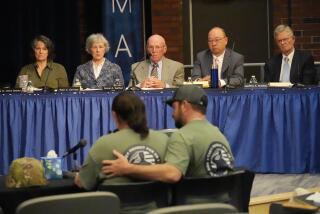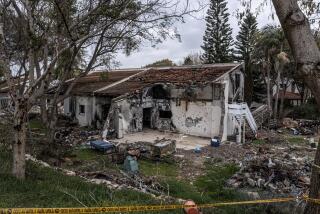S. Africa Homeland Massacre Ruled ‘Unlawful’
- Share via
JOHANNESBURG, South Africa — In a hard-hitting report, an independent judicial commission ruled Wednesday that the massacre of 28 black protesters by Ciskei homeland troops last month was “quite unjustified and unlawful.”
And the commission, headed by Judge Richard Goldstone, recommended that the Ciskei soldiers who participated in the “indiscriminate and prolonged shooting,” firing 425 rounds of live ammunition and four grenades at unarmed protesters, should be prosecuted.
The panel also sharply criticized the African National Congress, which organized the protest, for an end run on the Ciskei capital, Bisho, that “exposed marchers to the dangers of death and injury.”
The long ruling is certain to embarrass the government of President Frederik W. de Klerk, which has blamed the Sept. 7 massacre on the ANC. But Goldstone stopped short of condemning the South African government for not preventing the blood bath in Ciskei, whose military ruler receives substantial financial and military aid from Pretoria.
Goldstone, who had been asked by De Klerk to investigate the massacre, supported the ANC contention that the march by almost 60,000 on Ciskei was a peaceful protest that “still is the only form of peaceful political activity open to the vast majority of South Africans who remain disenfranchised.”
And the commission said that, if the Ciskei authorities had acceded to pleas from the South African government and peace monitors to allow a peaceful demonstration, “the violence could have been averted.”
“Those in control of any region, city or town anywhere in South Africa, including the homelands, should tolerate and allow complete freedom of expression and peaceful assembly,” the commission said.
In response, Ciskei’s council of state said it will give “serious consideration” to Goldstone’s recommendations. But it repeated its view that the ANC protest was not a peaceful march but a provocative act designed to coerce the homeland government to relinquish power.
De Klerk’s ruling National Party urged the authorities in Ciskei, which the government regards as an independent state, to carry out the Goldstone recommendations and “take serious note” of the panel suggestions that all homelands allow peaceful political activity.
But the party also criticized its opponents in the ANC and urged congress leaders to abide by the commission recommendation that political protests “calculated to result in conflict and violence” be abandoned.
Goldstone specifically urged the ANC to publicly censure Ronnie Kasrils, the ANC leader who led several dozen protesters in a charge on homeland office buildings during the march. A Ciskei magistrate had confined the protest to a stadium on the Ciskei border, but Kasrils and other ANC supporters raced through an opening in the stadium, triggering the fusillade.
The ANC’s national policy-making body, after a meeting Wednesday, welcomed the Goldstone report. But it rejected the recommendation that Kasrils be censured, saying that “if there was an error in judgment, it was a collective decision of the ANC for which we bear collective responsibility.”
The ANC has contended that the march was peaceful and that no matter what Kasrils did, the use of lethal force by Ciskei troops was unjustified.
(In its meeting Wednesday, the ANC’s executive committee also endorsed the agreement reached by ANC President Nelson Mandela and De Klerk on Saturday, saying it indicated “sufficient movement” to allow the ANC to return to the negotiating table.)
Goldstone’s summary of the events in Ciskei were a damning indictment of the black homeland government and its leader, Brig. Gen. Oupa Gqozo.
The four-member commission, which viewed extensive videotape of the incident, said it “experienced a feeling of disbelief that the shooting could have continued for what appeared to be an interminable amount of time.” The panel said the breakaway group led by Kasrils had turned and fled from the first moment that shots rang out, but the soldiers continued firing “virtually until the last of the fleeing crowd disappeared from sight.”
Ciskei officials have contended that the order to shoot, made by white South African officers on loan to the Ciskei army, came only after soldiers were fired on by the crowd.
Goldstone said it was highly improbable that the demonstrators had fired, though he did not rule out the possibility.
More to Read
Sign up for Essential California
The most important California stories and recommendations in your inbox every morning.
You may occasionally receive promotional content from the Los Angeles Times.














